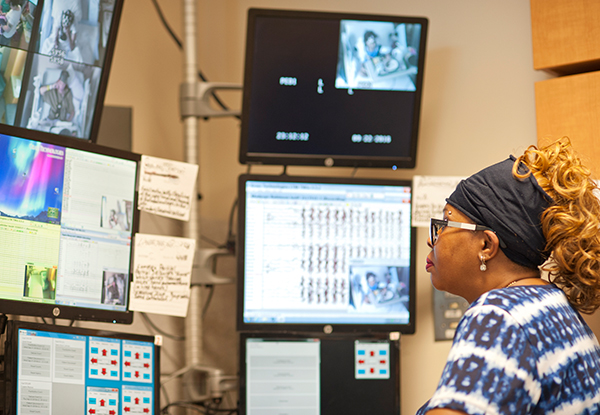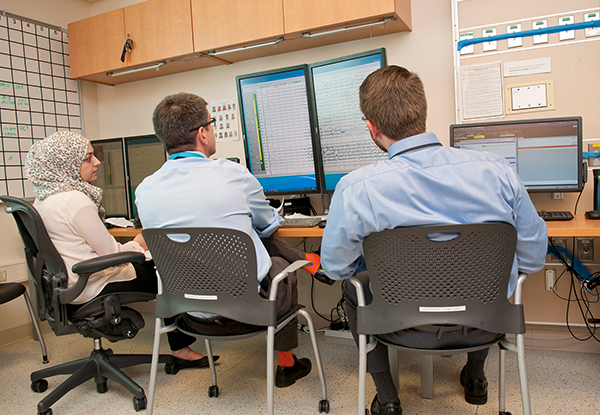Epilepsy centers provide a comprehensive team approach to the diagnosis and treatment of epilepsy. A patient-oriented team will typically include epileptologists (neurologists with expertise in treating seizures), neurosurgeons, neuropsychologists, nurse specialists, EEG technologists, social workers, and others with training and experience in epilepsy care. Specialized epilepsy centers provide routine care to individuals with seizures or epilepsy, and specialize in providing comprehensive diagnostic and treatment services to individuals with uncontrolled seizures (i.e., intractable or refractory epilepsy).
Levels of Epilepsy Care
 NAEC recognizes four levels of epilepsy care which are described in NAEC’s Guidelines for Essential Services, Personnel, and Facilities in Specialized Epilepsy Centers in the United States, published in Epilepsia in 2010. The levels of epilepsy care are a useful tool for both patients and healthcare providers to evaluate the appropriateness and quality of specialized epilepsy care.
NAEC recognizes four levels of epilepsy care which are described in NAEC’s Guidelines for Essential Services, Personnel, and Facilities in Specialized Epilepsy Centers in the United States, published in Epilepsia in 2010. The levels of epilepsy care are a useful tool for both patients and healthcare providers to evaluate the appropriateness and quality of specialized epilepsy care.
NAEC defines four levels of epilepsy care and accredits epilepsy centers that provide level 3 and 4 care:
- Level 1 epilepsy care typically occurs at an emergency room or a primary care physician’s office with an epilepsy evaluation.
- Level 2 epilepsy care involves a consultation with a general neurologist. This consultation may occur at a specialized epilepsy center.
- Levels 3 and 4 care takes place at specialized epilepsy centers.
All epilepsy centers listed in NAEC’s directory have completed the NAEC accreditation process for the current year or are listed as Applicants if they have yet to complete the accreditation process. Centers listed as “Level 3 Center” or “Level 4 Center” have met all criteria for their level. Centers listed as “Level 3 center – Conditionally-Accredited” or “Level 4 Center – Conditionally-Accredited” are substantially compliant with all criteria, but are deficient in at least one criterion. These centers have one year to address any issues and achieve compliance with all accreditation criteria.
Differentiating Features of Level 3 and 4 Centers
Level 3 Epilepsy Center
A level 3 center provides the basic range of medical, neuropsychological, and psychosocial services needed to treat patients with refractory epilepsy. Level 3 epilepsy centers provide basic neurodiagnostic evaluations, as well as basic medical, neuropsychological, and psychosocial services. Some level 3 centers offer noninvasive evaluation for epilepsy surgery, straight-forward resective epilepsy surgery, and implantation of the vagus nerve stimulator. These centers do not perform intracranial evaluations or other more complex epilepsy surgery.
 Level 4 Epilepsy Center
Level 4 Epilepsy Center
A level 4 center provides the more complex forms of intensive neurodiagnostic monitoring, as well as more extensive medical, neuropsychological, and psychosocial treatment. Level 4 centers also offer a complete evaluation for epilepsy surgery, including intracranial electrodes and a broad range of surgical procedures for epilepsy.
In its published Guidelines, NAEC recommends when patients should be referred to a level 3 or 4 center. Delayed or denied referral may be detrimental to the patient’s health, safety and quality of life.
- If your seizures have not been brought under control after three months of care by a primary care provider (family physician, pediatrician), further neurologic intervention by a neurologist, or an epilepsy center if locally available, is appropriate.
- If you are seeing a general neurologist, and your seizures have not been brought under control after 12 months, you should request a referral to a specialized epilepsy center with an epileptologist.